The late Dr Chee Phui Hung (Medicine ’50) was instrumental in successfully lobbying for the return of the historic Bukit Timah Campus — where he had attended classes as a student — to NUS. This spirit of giving back to the University is being kept alive today, even thousands of miles away, by the likes of individuals such as Mr Anuj Jagannathan (Business ’16), Chairperson of NUS Alumni San Francisco Chapter since July 2019. “My goal is to revive this dormant chapter and bring together alumni from all schools and faculties who are living in the San Francisco Bay Area,” he says. “It’s a challenge, but one that I enjoy. I’m glad to help in whatever way I can to maintain the connection between alumni and our alma mater.”
NUS’ main conduit for forging ties with its 312,000-strong global alumni community is its Office of Alumni Relations (OAR). However, Alumni Relations Director Mr Bernard Toh (Architecture ’84) remarks that it is “insufficient” for OAR alone to look after the entire alumni base. Paraphrasing the proverb that ‘it takes a village to raise a child’, Mr Toh says, “It takes a University to engage alumni. Alumni engagement should not be a functional discharge but a holistic endeavour. There has to be an integrated University-wide effort, where everyone contributes in his/her own way to furthering alumni relations.” And he has a plan to make it happen.
BUILDING SOCIAL CAPITAL
Promoting alumni engagement has been a priority for each of the last three NUS Presidents. At the 2007 Commencement Dinner, then-President Professor Shih Choon Fong said, “I asked three things of our alumni: to believe in the aspirations of alma mater, to speak well of alma mater, and to give to alma mater.” His successor, Professor Tan Chorh Chuan (Medicine ’83), likewise said in his 2008 State of the University Address: “Today, our alumni form the third pillar which holds our University proudly up, joining the other two pillars formed by our faculty and staff, and our students.”
Under NUS’ current President Professor Tan Eng Chye (Science ’85), attention is being paid to the enduring relationship alumni can enjoy with the University, with lifelong learning now a cornerstone of NUS’ Vision, Mission and Values. “The relationship between an alma mater and her alumni is transitioning rapidly, from ‘once upon a time’ to lifetime learning partners, and we hope to have an opportunity to renew and strengthen our bonds before too long,” said Prof Tan during his 2019 Commencement Dinner speech.
Formed in 2003, OAR arose out of a restructuring exercise that also led to the creation of a separate NUS Development Office (DVO). DVO is tasked with securing philanthropic support from donors including alumni, with the gifts being used to set up endowed chairs or professorships, support financially-strapped students and build cutting-edge research facilities, for example. This allows OAR to focus on the ‘people’ side of things. To be sure, OAR is still involved in some fundraising initiatives, and both Offices collaborate on giving campaigns from time to time. Nonetheless, the separated model sends a signal that there is more to alumni outreach than simply seeking donations. “We’re here to build mutually beneficial and lifelong relationships with alumni,” says Mr Toh of OAR’s mission. Raising funds for the University, though important, is not OAR’s chief concern.
DIFFERENT STROKES FOR DIFFERENT FOLKS

Being such a large, diverse community, NUS alumni naturally have myriad reasons and preferences for reconnecting with one another and with the University. “Any touchpoint is a good start. In anything we do, we try to instil a sense of belonging and pride in our alma mater,” says Ms Florence Neo (Arts and Social Sciences ’93), Director and Head, Alumni Communications and Engagement, OAR.
> NUS alumni span different phases in life.
- 49 per cent are young alumni (aged 40 and below)
- 39 per cent are prime alumni(aged 41 to 60)
- 12 per cent are senior alumni (aged 61 and above)
> OAR organises about 80 events a year across a variety of categories, attracting 17,000 attendees globally.
- Thought leadership — e.g. NUS Alumni Leaders Forum, U@live
- Lifelong learning — e.g. Future-ready Workshops
- Arts and culture — e.g. Film Festivals
- Networking — e.g. Thirsty Thursdays, Breakfast/Lunch Dialogues, Alumni Dialogues, NUS President’s Dialogue Lunch
- Sports and wellness — e.g. NUS Alumni & Friends Golf Tournament, UM-NUS Inter-University Tunku Chancellor Golf Tournament and Health and Wellness talks
- Homecomings — e.g. Bukit Timah Homecoming, Kent Ridge Alumni Family Day
- Appreciation — e.g. NUS Alumni Awards
- Community Service — e.g. NUS Day of Service
> OAR offers physical and digital perks to alumni.
- NUS Shaw Foundation Alumni House (SFAH) has several dining options, and venues and meeting rooms open to booking
- AlumNUS Card holders enjoy exclusive privileges from more than 100 merchants
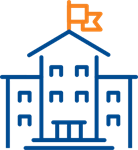 DID YOU KNOW?
DID YOU KNOW?
NUS Office of Alumni Relations was established in 2003, but the University’s alumni engagement efforts go as far back as 1923 — the year the Medical Alumni Association (originally called the Singapore Medical College Graduates’ Association) was founded.
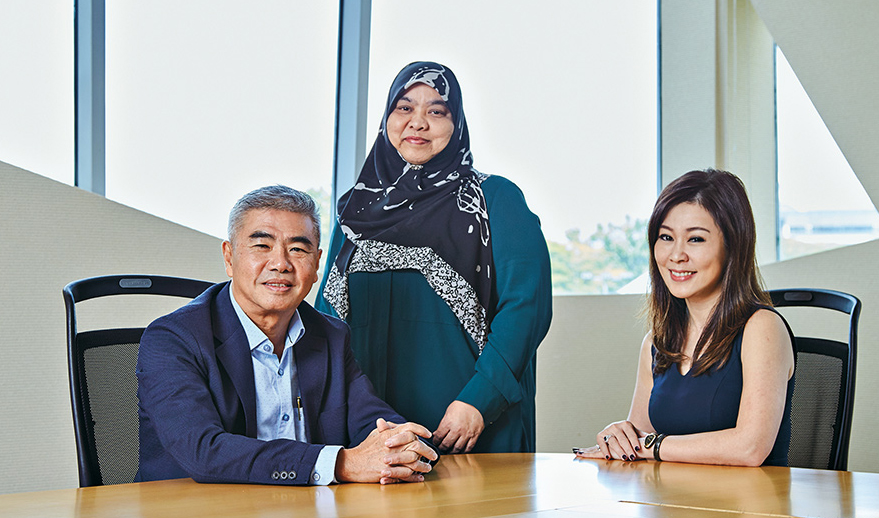 The OAR leadership team (from left): Mr Bernard Toh, Ms Hamidah Salleh and Ms Florence Neo.
The OAR leadership team (from left): Mr Bernard Toh, Ms Hamidah Salleh and Ms Florence Neo.
Ms Florence Neo (Arts and Social Sciences ’93), Director and Head, Alumni Communcations and Engagement, OAR, also stresses this point. Referring to the “3Ts” model of Time, Talent and Treasure — which is widely adopted by advancement professionals, or people involved in fundraising for the advancement of education — Ms Neo clarifies: “Alumni Treasure-giving is handled by DVO, while our efforts at OAR are directed towards creating opportunities for alumni to give their Time and Talent, whether by joining committees, serving as mentors or speakers, or giving constructive feedback about our programmes.”
While OAR has done a good job of serving NUS alumni and meeting their varied interests, Mr Toh believes there is still more that can be done to sustain alumni interest and engage them even more fully in University activities. “We’ve grown beyond organising parties or social events, and have reached a stage where we want deeper levels of engagement. Our aim is to promote intellectual discourse and cultivate more alumni volunteers,” he says, calling for “two-way participation” between OAR and alumni.
![]()
We’ve grown beyond organising parties or social events, and have reached a stage where we want deeper levels of engagement. Our aim is to promote intellectual discourse and cultivate more alumni volunteers.
Mr Bernard Toh, Director, NUS Alumni Relations
PAVING A TWO-WAY STREET
Some of the most passionate alumni volunteers — which totalled 1,426 in 2018 — are those sitting on the NUS Alumni Advisory Board (AAB), chaired by the NUS President. Its Co-Chair, Mr Johnny Tan (Science ’82), is a former President of the NUS Society (NUSS) and has served on the Board since 2009. “AAB members have become increasingly proactive in the last decade, and the University is also more open to their ideas. Instead of just attending or supporting OAR-organised events, we are seeing more alumni-led activities,” says Mr Tan.
In particular, three initiatives by AAB members have really taken off:
- U@live The brainchild of Mr Viswa Sadasivan (Arts and Social Sciences ’83), this series promotes intellectual discourse through discussions of topical issues.
- NUS Alumni Bursary Fund Campaign Launched in 2013, the Campaign aims to cultivate the spirit of giving among alumni and provide financial support for deserving NUS students. It is spearheaded by the Alumni Student Advancement Committee (ASAC), which in April 2019 saw the chairmanship change hands from Mr Tan to fellow AAB member Mr Seah Cheng San (Engineering ’82, MBA ’92).
- NUS Day of Service Launched in 2016 and led by Mr Jeremy Ee (Engineering ’05), this event encourages the whole NUS family to come together to give back to society.
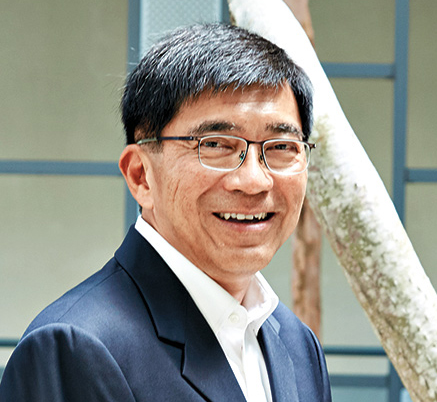
AAB members have become increasingly proactive in the last decade, and the University is also more open to their ideas. Instead of just attending or supporting OAR-organised events, we are seeing more alumni-led activities.
Mr Johnny Tan, Co-Chair, NUS Alumni Advisory Board
“U@live was initiated in 2011 in response to a lament that despite having moved up the global university rankings, NUS did not have enough of an intellectual climate,” explains Mr Viswa. By this, he is not referring to academic pursuits or domain-specific forums, but rather “a culture where we are interested in what’s going on — in what ought to matter — and raise tough existential questions and debate on them”.
To further crystallise this objective, the series was rebooted in 2019 as U@live: Lifting Thought Leadership. Instead of featuring an accomplished personality, U@live sessions now feature a panel of subject matter experts from within and outside the University. At the latest session in October 2019, panellists had a robust, no-holds-barred discussion on the hot-button topic of Islamophobia. “A great University is one that doesn’t shy away from discussing pressing issues candidly and openly, yet in a responsible and not disagreeable manner. We need to demonstrate that we have the courage and wherewithal to push frontiers, if we are to claim a seat at the table with top global universities,” argues Mr Viswa.
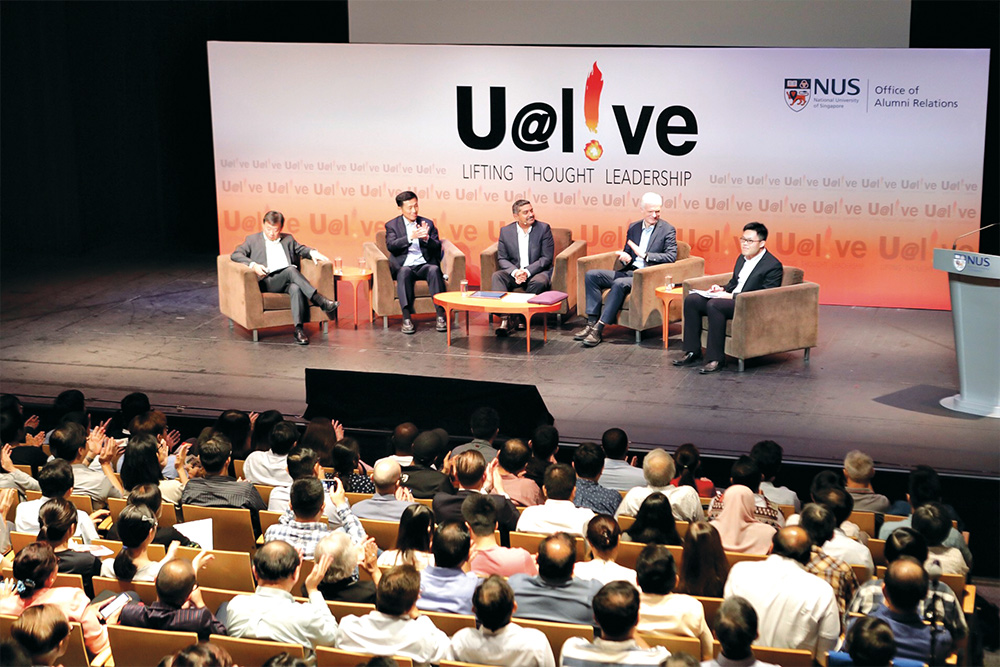 Spearheaded by Alumni Advisory Board member Mr Viswa Sadasivan, the U@live panel discussion series has proven a popular draw for the NUS community, which includes staff, students and alumni.
Spearheaded by Alumni Advisory Board member Mr Viswa Sadasivan, the U@live panel discussion series has proven a popular draw for the NUS community, which includes staff, students and alumni.
As part of ASAC, Mr Yeo Keng Joon (MBA ’85) helps raise funds for the NUS Alumni Bursary Fund Campaign. In 2015, Mr Yeo and his wife, Mdm Kong Yuet Peng (MBA ’86), set up the NUS Campus Couples Bursary Fund and in conjunction, the NUS Campus Couples Alumni group was launched. “We want to appeal to people who, like us, met their spouses on campus and have had good careers and family lives. Because NUS was where it all started, many of them are grateful to the University and happy to contribute,” he reasons.
However, raising funds for bursary needs is not the sole intent of NUS Campus Couples Alumni. “The majority of alumni couples are youths, like me and my husband,” says its current Chairperson, Ms Sarah Ong (Nursing ’12). “Because we’re still establishing our careers and starting a family, most of us are not in a position to give back financially. Instead, we organise activities to help strengthen bonds between young couples, and for them to meet other NUS couples. Our focus is on people and relationships.” The group’s annual NUS Campus Couples event, which takes place around Valentine’s Day, is billed as a Celebration of Love and Giving — an appreciation dinner for those who donated to the Fund, while doubling as an opportunity to fit in some ‘couple time’.
NUS Day of Service (DOS) has grown progressively in scale and scope since it was launched in 2016. With each passing year, more and more alumni, students, staff and family members — both in Singapore and abroad — are signing up to either champion or participate in community service projects. Among them are Ms Joanna Loo (Science ’71), Chairperson of NUS Alumni Sing-Along; and Mr Sonny Yuen (Business ’85), former President of the NUS Business School Alumni Association (NUSBSA) from 2014 to 2018.
Learning Never Ends
Greater emphasis has been placed on lifelong learning at NUS following the establishment of NUS School of Continuing and Lifelong Education (SCALE) in 2016, and especially after Prof Tan’s appointment as NUS President in 2018. That year, SCALE rolled out a novel NUS Lifelong Learners (L3) initiative for alumni, which offers a wide array of skills-based, industry-relevant courses necessary to stay competitive in today’s digital age. Each alumnus is given a virtual voucher that can be used to take one course for free, and the modular courses are stackable towards a certificate or qualification.
NUS alumni and the general public can also apply for SCALE’s other continuing education offerings.
These alumni see the value of NUS’ move into lifelong learning:
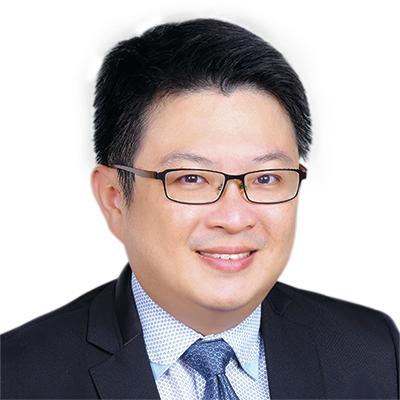
“Data analytics, artificial intelligence and machine learning applications are fast being utilised across various industries. Having skillsets and knowledge of these technologies will assist businesses to achieve sustainable growth.”
Mr Tan Khai Chyeh (Engineering ’04), Supply Chain Singapore Lead for an MNC, currently in SCALE’s MSc in Industry 4.0 programme.
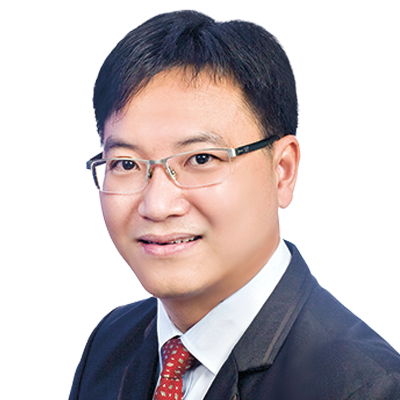
“As I am back at my alma mater, I’m already comfortable with the University’s environment and culture. I don’t need to adapt to new surroundings, which might hinder my focus and studies.”
Mr Kong Kok Fung (Engineering ’17), an Automation Manager, currently also pursuing an MSc in Industry 4.0.
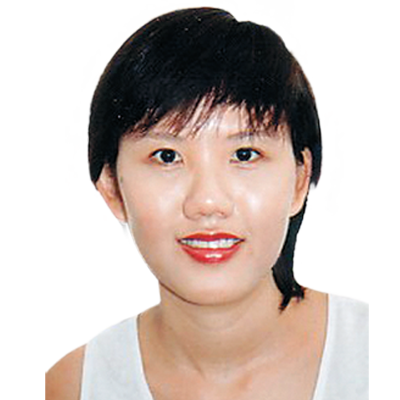
“I was pleasantly surprised to learn that alumni are entitled to take one free module. It has been years since I studied and I stopped working to be a full-time mum, so this was an opportunity for me to get back in touch with industry and academics.”
Ms Bernadette Kueh (Engineering ’92), a homemaker who took the NUS L3 ‘Enterprise Development’ course from August to November 2019.
Made up of senior alumni with a shared interest in music, NUS Alumni Sing-Along holds monthly sing-along sessions at SFAH, in addition to related activities like ukulele-playing and line dancing. Its members have taken part in DOS for two years running, where they entertained nursing home residents with sing-along performances. “Our members feel a sense of pride when they serve the community as part of the NUS family. Furthermore, being connected to our alma mater and contributing to the community gives members — most of whom are retirees — a sense of self-worth,” says Ms Loo.
NUSBSA has been involved in DOS since 2017, with members volunteering to pack and distribute food to needy families in Singapore. This is on top of regular activities such as business networking sessions, CEO talks, and mentorship and internship programmes. “Volunteering allows us to add value or make a difference in someone else’s life. We also gain a morale boost in knowing that our effort was meaningful, which increases our own happiness,” says Mr Yuen.
In a bid to further encourage alumni volunteerism and enhance Board diversity, Mr Tan reveals that the selection process for the next term of the AAB — typically only appointed by the NUS President — has been changed: starting January 2020, NUS staff and alumni can also nominate worthy candidates to be AAB members. “This will open up the selection process and help us to achieve a better mix of members with different professional backgrounds, and who cover the spectrum in terms of age and gender,” says Mr Tan. Up to three candidates will be chosen through this process. Their term will begin in July 2020 and last two years.
Through Thick And Thin
Apart from his continued involvement with NUSBSA, Mr Sonny Yuen (Business ’85) is also the founding President of Raffles Hall Association and current Chairperson of NUS Alumni Leaders Forum. These experiences have enabled him to witness the multifaceted benefits of staying connected to one’s alma mater — not just career-wise through the network of professional contacts, but on the most deeply personal level, too.
When a friend from Mr Yuen’s Raffles Hall days was recently diagnosed with a terminal illness, the entire cohort rallied to lend moral and financial support. Other cohorts also pitched in to help cover the family’s expenses, and one younger alum even offered the friend a full-paying job while he was in the hospital ward. “The two of them were more than 10 years apart in age and didn’t know each other, but they had one thing in common — being a Rafflesian,” says Mr Yuen. “Such is the power of bonds among alumni.”
NUS alumni can benefit from the vast networks that they can tap on. As nurturing alumni, they can provide guidance or impart knowledge and skills to juniors.
Dr Kuan Yee Han, Associate Director for Alumni Relations, Tembusu College
TO ENGAGE AND EXPAND
Acting as a sort of liaison between OAR and alumni are the Associate Directors for Alumni Relations, each attached to a specific faculty, school, department, hall or residential college. All 28 Associate Directors are responsible for engaging their respective alumni sub-communities, and they meet with OAR staff on a quarterly basis to share updates.
Within the Faculty of Arts and Social Sciences (FASS), this role is filled by its Vice Dean (External Relations and Student Life), Associate Professor Loy Hui Chieh (Arts and Social Sciences ’98). FASS runs a number of alumni engagement initiatives that are complementary to those organised by OAR. These include the FASS Mentorship Programme, which pairs successful FASS alumni with undergraduates; the ‘My FASS Family’ Host Programme, where FASS alumni host and befriend international students staying in Singapore; and the FASS STARS Awards, which recognises the achievements of distinguished staff and alumni.
Ad hoc engagement opportunities are also available. “When creating our Philosophy, Politics and Economics major in 2017, I interviewed 14 senior HR managers from public and private organisations to get their feedback, and at least half of them were alumni. More recently, when fleshing out the details for our new FASS 2.0 Industry Tracks programme, we spoke to alumni working in each of the identified industries. Their feedback helped us shape our programme,” says Prof Loy. Close to 300 alumni also attended the FASS90 Gala Dinner in November 2019 to celebrate the Faculty’s 90th anniversary.
Prof Loy’s counterpart at NUS Business School, Head of Alumni Relations Mr George Heng (Computing ’93), notes that Business alumni are very active in the professional networking scene. “Besides the usual networking drinks, we will be organising talks with an intellectual element so that our alumni get more value out of the interactions,” says Mr Heng. The School also offers lifelong learning programmes through its Executive Education unit, as well as in partnership with SCALE.
For those who want to get more involved, Business alumni can contribute in multiple ways, such as speaking at recruitment fairs, hosting company visits, and assisting in the interview-screening process of postgraduate candidates. This leads to a win-win scenario, as Mr Heng explains: “By contributing their time and resources, alumni can raise their profiles and visibility and widen their networks, while the University also benefits.”
Over at NUS UTown, Tembusu College’s Director of Student Affairs Dr Kuan Yee Han (Engineering ’10) serves as its Associate Director for Alumni Relations. Several events have been initiated to draw Tembusu alumni back to the residential college, such as ‘Past vs Present’ exhibition matches organised by the College’s ultimate frisbee and tchoukball interest groups; ‘AlumChats’, or sharing sessions by alumni on their industry experiences; workshops featuring alumni coaches; as well as Tembusu Forums and festive reunions. “NUS alumni can benefit from the vast networks that they can tap on,” says Dr Kuan. “As nurturing alumni, they can provide guidance or impart knowledge and skills to juniors. Nostalgic alumni can relive their years at the College through participation in College-related activities. For professionally-driven alumni, they can leverage on networking opportunities with students and other working alumni.”
Although the Associate Directors are mostly preoccupied with their own alumni sub-communities, many are starting to look beyond their respective loci and take part in University-wide events such as DOS. Alumni from FASS, NUS Business and Tembusu College have come on board as DOS champions in recent years to helm community service projects. OAR’s Ms Neo is heartened by this trend, as it indicates a concerted effort to strengthen and deepen alumni relations across the University.
THE BIG FIVE-O
Like FASS, NUS School of Design and Environment (SDE) hit a big milestone in 2019 as the School celebrated its 50th anniversary. A number of events were held to mark the occasion, beginning with the official opening of SDE4 — Singapore’s first new-build net-zero energy building — in January 2019. Designed by Dr Christopher Lee (Architecture ’95), SDE4 is the first university building in the world, and the first building in Singapore, to attain WELL CertifiedTM Gold. SDE Dean Professor Lam Khee Poh calls SDE4 a “potent and visible outreach mechanism, as our alumni feel proud whenever they see it”.
Subsequently, the Building and Estate Management Alumni (BEMA) group organised a charity golf game and raised more than $600,000 for the newly-launched SDE Development Fund. The Fund will be used to support the future development of SDE’s facilities and curriculum. About 1,200 alumni also attended the SDE50 Gala Dinner in October 2019. “We’ve made a conscious effort to expand alumni outreach by updating our websites and social media platforms, resulting in greater web traffic,” adds Prof Lam.
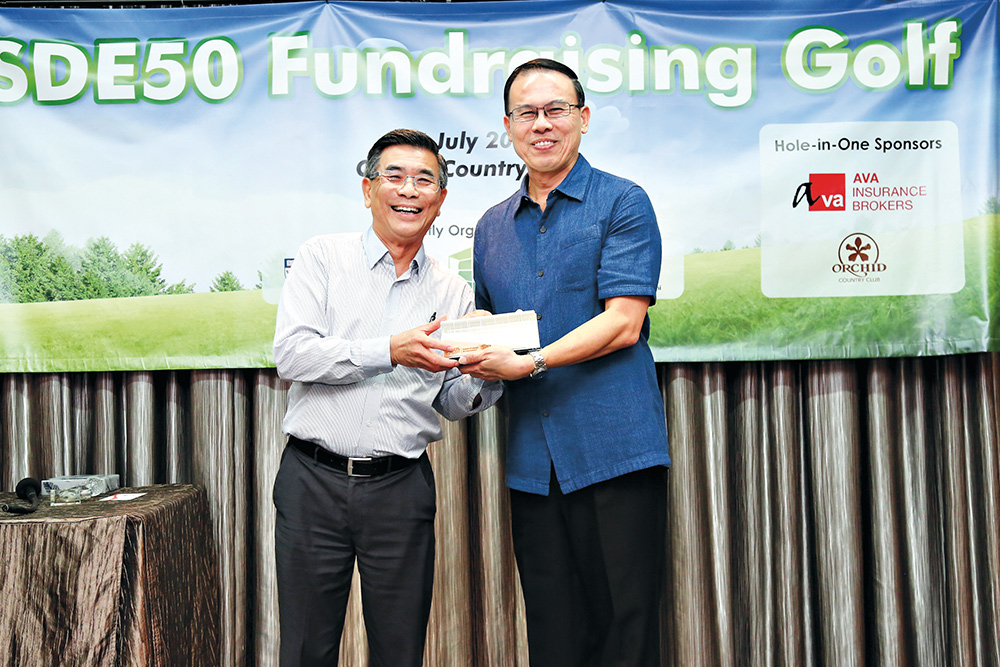 Prof Lam (left) with President of BEMA Dr Teo Ho Pin (Building ’85) at the SDE50 Fundraising Golf and Appreciation Dinner.
Prof Lam (left) with President of BEMA Dr Teo Ho Pin (Building ’85) at the SDE50 Fundraising Golf and Appreciation Dinner.